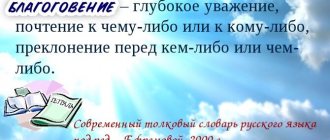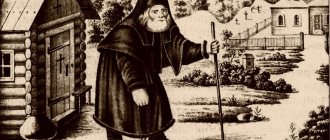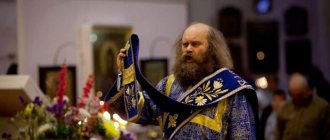The loss of a loved one always takes a person by surprise. In addition to the worldly worries that need to be dealt with after a tragedy, a person is faced with the need to properly remember the deceased. For people who do not know church rituals, it is sometimes difficult to figure out how to do everything correctly.
© Depositphotos
My heart and soul want to remember a loved one and put their soul to rest, but I have to figure out a lot: what a memorial service is, when the funeral service is held and why read the litiya. To make this task easier, the editors of “So Simple!” answers these questions and tells what the difference is between a funeral service, a memorial service and a lithium.
The history of the appearance of common prayers
The Greek word lite is literally translated as “earnest prayer.” In Orthodoxy, this term has the same meaning, but with one remark - the action is performed outside the temple. Sacred ceremonies may differ in order, but to perform them it is necessary to leave the church walls.
Diligent prayer request is carried out outside the church
The Departure symbolically shows the unworthiness of ordinary lay people to pray in the temple. From here follows a somewhat minor scale of prayer chants. The narthex, where worship is held, is a metaphorical boundary between the church and the world. Thus, even an unchurched person can become a participant in general petitions.
Diligent prayer petitions appeared during the time of Emperor Constantine I. Sacred rites were carried out in places of natural disasters, wars or armed conflicts. However, by the 3rd century they began to perform another rite, but of a more joyful nature. This tradition was actively supported by the Jerusalem Church, which concluded its festivities with solemn results, and later the Sunday evening service.
Sorokoust
Sorokoust is a special prayer that is read for 40 days at the Divine Liturgy. Sorokoust can be for both health and peace. The funeral magpie is performed for the same thing as other successions: to beg God for forgiveness of the sins of the deceased and to make his afterlife easier.
At the proskomedia, the priest takes out one particle at a time from the prosphora, pronouncing the names from the submitted notes “On Repose.” These actions are certainly performed on the altar, where prayer gains great power. At the end of the Divine Liturgy, the particles are lowered into the chalice with the Blood of Christ as a sign of washing away the sins of all the mentioned deceased. This rank is called “with a particle.”
Varieties of lithium
In Orthodoxy, general prayers of the laity are held in three different rites. Each of them has its own purpose and features of implementation.
Evening
This sacred rite is part of the Saturday service (after mass) or the festive all-night vigil. According to tradition, a solemn procession with holy icons and banners took place along the main streets of the city. Believers asked the Almighty to forgive their sins, repented, and also prayed for help. Today, the ceremony is held on the territory of the temple.
During the procession, Christians ask for the intercession of the Most Pure Virgin Mary, turn to the saints, and also recognize the Life-giving power of the Holy Cross.
The polyphonic pronunciation of prayers helps Orthodox believers to merge in one spirit with the Apostles, Nicholas the Wonderworker and other saints.
Author's advice
Participants in the prayer thank the Creator, spiritual fathers, their parish and the place where they were born. It is permissible to ask for intercession for wanderers, as well as loved ones suffering from serious illnesses. The laity pray for salvation from sinful passions, vices, and base desires.
Funeral
Following the deceased is performed three times:
- when they carry the coffin with the deceased into the yard;
- in the cemetery, at the grave;
- after the funeral, at home.
The funeral lithium can be read by a lay person if there is no Church minister nearby. Close and relatives accompanying the deceased on his last journey first sing “Wisdom” and “Pureest”. Then an akathist for repose is read, which ends with a minute of silence. Next, they remember out loud the good deeds performed by the deceased, and also say good words about him. The procession ends with the cemetery ceremony.
Litia for the dead is a powerful rite in Orthodox Christianity
During disasters
As stated earlier, enhanced prayer requests were originally carried out to prevent disasters and misfortunes. Christian believers gathered together to pray to the Lord for protection from epidemics, droughts, floods, and earthquakes. Turning to the Almighty, they united in a single prayer service, which was accompanied by a religious procession. At the same time, litia was performed not only during the violence of the elements, but also after its end.
Litia for the dead for the laity with Russian translation
Through the prayers of the saints, our fathers, Lord Jesus Christ, our God, have mercy on us. Amen.
Through the prayers of our holy fathers, Lord Jesus Christ our God, have mercy on us.
Glory to Thee, our God, glory to Thee.
Heavenly King, Comforter, Soul of truth, Who is everywhere and fulfills everything, Treasure of good things and Giver of life, come and dwell in us, and cleanse us from all filth, and save, O Good One, souls ours.
The prayer to the Holy Spirit is not read from Easter to Trinity Day.
Heavenly King, Comforter, Spirit of Truth, abiding everywhere and filling everything, Treasury of blessings and Giver of life, come and dwell in us, and cleanse us from all filth, and save, O Good One, our souls.
Holy God, Holy Mighty, Holy Immortal, have mercy on us. (three times)
Holy God, Holy Mighty, Holy Immortal, have mercy on us.
Glory to the Father and the Son and the Holy Spirit, now and ever and unto ages of ages. Amen.
Glory to the Father, and the Son, and the Holy Spirit, now, and always, and unto ages of ages. Amen.
Most Holy Trinity, have mercy on us; Lord, cleanse our sins; Master, forgive our iniquities; Holy One, visit and heal our infirmities, for Thy name's sake.
Most Holy Trinity, have mercy on us; Lord, cleanse our sins; Lord, forgive our iniquities; Holy One, visit and heal our infirmities, for Thy name's sake.
Lord, have mercy (three times)
Glory to the Father and the Son and the Holy Spirit, now and ever and unto ages of ages. Amen.
Our Father, who art in heaven! Hallowed be Thy name, Thy kingdom come, Thy will be done, as it is in heaven and on earth. Give us this day our daily bread; and forgive us our debts, just as we forgive our debtors; and do not lead us into temptation, but deliver us from the evil one.
Our Father, who is in heaven! Hallowed be Thy name, Thy kingdom come, Thy will be done on earth as it is in heaven; Give us our daily bread today; and forgive us our debts, as we forgive our debtors; and lead us not into temptation, but deliver us from evil.
Lord have mercy. (12 times)
Glory to the Father and the Son and the Holy Spirit, now and ever and unto ages of ages. Amen.
Come, let us worship the King our God.
Come, let us worship our King, God.
Come, let us worship and fall down before Christ, our King God.
Come, let us worship and fall before Christ, the King, our God.
Come, let us bow and fall down to Christ Himself, the King and our God.
Come, let us bow and fall before Christ Himself, our King and God.
Psalm 90
Living in the help of the Most High, he will dwell in the blood of the Heavenly God. Says the Lord: Thou art my protector, and my refuge, my God, and I trust in Him. For He will deliver you from the net of the trap and from the words of rebellion, His splash will overshadow you, and under His krill you hope that His truth will surround you with weapons. Do not fear from the fear of the night, from the arrow that flies in the days, from the thing that passes in the darkness, from the clot and the demon of the midday. Thousands will fall from your country, and darkness will be at your right hand, but it will not come near you: behold your eyes, and see the reward of sinners.
For You, O Lord, are my hope, You have made the Most High your refuge. Evil will not come to you, and wound will not come near your body. As His angel commanded you, to keep you in all your ways. They will lift you up in their arms, lest they dash your foot against a stone. Step on the asp and the basilisk, and cross the lion and the serpent. For I have trusted in Me, and I will deliver; I will cover you, because you have known My name. He will call to Me, and I will hear him; I am with him in tribulation, I will destroy him, and I will glorify him; I will fill him with long days, and I will show him My salvation.
He who lives with the help of the Almighty will find his home under the roof of the heavenly God. He will say to the Lord: “You are my protector and my refuge, my God, and I trust in Him.” For He will deliver you from the snare of fishers and from the disturbing news. He will hide you behind His shoulders, and under His wings you will hope; His truth will surround you like a weapon. You will not be afraid from the fear of the night, from an arrow flying during the day; from danger wandering in the darkness, from misfortune and the demon of the midday. A thousand will fall at your side, and ten thousand at your right, but they will not come close to you. Only with your eyes will you look and see the reward of sinners.
For You, Lord, are my hope! You have made the Most High your refuge. Evil will not approach you, and the scourge will not come close to your tent, for He will command His angels for you, to keep you in all your ways; they will carry you in their hands, so that you do not stumble on a stone with your foot. You will tread on the asp and the basilisk, and you will trample the lion and the dragon. “For he trusted in Me, and I will deliver him, I will cover him, for he has known My name. He will call Me, and I will hear him, I am with him in sorrow, I will deliver him and glorify him, I will fill him with long life and show him My salvation.”
Glory to the Father and the Son and the Holy Spirit, now and ever and unto ages of ages. Amen.
Alleluia, alleluia, alleluia, glory to you, God. (three times)
Troparion, tone 4:
From the spirits of the righteous who have passed away, give rest to the soul of Your servant, O Savior, preserving it in the blessed life that belongs to You, O Lover of Mankind.
With the spirits of the righteous who have passed away the soul of Thy servant [or: Thy servant], Savior, preserving her rest in the blessed life that is with You, O Lover of Mankind.
In Thy chamber, Lord, where all Thy saints rest, give rest also to the soul of Thy servant, for Thou art the only Lover of mankind.
In Thy resting place, O Lord, where all Thy saints find peace, give rest also to the soul of Thy servant [or: Thy handmaid], for Thou alone art the Lover of mankind.
Glory to the Father and the Son and the Holy Spirit.
You are God, who descended into hell, and who can loose the bonds of the bound, who give rest to you and the soul of your servant.
You are our God, who descended into hell and ended the torment of the prisoners, and give rest to the soul of Your servant [or: Your servant].
And now and ever and unto ages of ages. Amen.
One Pure and Immaculate Virgin, who gave birth to God without a seed, pray for his soul to be saved.
One pure and immaculate Virgin, who bore God in her womb inexpressibly, intercede for the salvation of the soul of Thy servant [or: Thy servant].
Sedalen, voice 5th:
Rest, our Savior, with the righteous of Thy servant, and this one has settled in Thy courts, as it is written, despising, as Good, his sins, voluntary and involuntary, and all that is known and not known, to Man By the way.
Kontakion, tone 8:
With the saints, rest, O Christ, the soul of Your servant, where there is no sickness, no sorrow, no sighing, but endless life.
With the saints, rest, O Christ, the soul of Thy servant [or: Thy servant], where there is no pain, no sorrow, no groaning, but endless life.
Features of the commission
As a rule, fervent general prayer is read in Church Slavonic. The priests leave the temple through the northern passage, closing the main gate behind them. The deacon stands next to the priest, holding a censer in his hands. Servants with candlesticks walk in front of them, and a choir of singers accompanies the procession.
Coming out of the church, the clergyman censes the holy images. Ordinary laity at this time personify the prodigal sons who returned to their home. At the same time, they express sorrowful repentance. But the exit of the clergy from the temple is identified with the coming of the Savior to earth.
The universal lithium can be nationwide and universal.
The difference between a lithium and a memorial service
People often do not see the difference between these two rituals. Theologians define the departure as a component of the funeral service. The latter is a prayer for the salvation of the soul of the deceased, and can be performed any day after burial. But the funeral service is read only during funerals. As a rule, it lasts about 5 minutes, being a shortened version of the church service for the deceased.
Funeral services are held any day after the burial
The laity, gathered for intense prayer, unite their faith, making it unshakable. Exodus, as part of the Orthodox service, has its own deep meaning, helping Christians to become closer to God.
If you find an error, please select a piece of text and press Ctrl+Enter.
Funeral service in church
The funeral service is a special prayer that is performed once over a deceased believer on the third day after death, before burial. The funeral service for the deceased is performed by a clergyman in a church or chapel. According to custom, the funeral service for the deceased must be performed on the third day, but there are cases when it is allowed to do this later, even after repose.
On all days, the funeral service is performed according to one rite, except for the days of Bright Easter Week. These days, instead of sad funeral prayers, joyful chants are sung in honor of Holy Easter. On the days of the Resurrection and the Nativity of Christ, the deceased are not brought into the church, and the funeral service is not performed. In this case, it is postponed to the next day.
© Depositphotos
In the Orthodox Church, funeral services are not performed for the unbaptized, those of other faiths, those who fight against God, those who renounced Christ, or suicides. Until recently, funeral services for unbaptized infants were also not performed, but recently a special rite for this appeared. Therefore, parents who have experienced a terrible tragedy will be able to calm their hearts and pray for their child.
The funeral service takes place in order to conduct the soul of the deceased to the Lord. The deceased needs nothing more from us, no worldly goods, only sincere prayer for him. This is what everyone on earth can do for a person who has gone to another world. During the funeral service, the entire church prays for the person’s soul, giving hope for the remission of all sins.
The funeral service for the deceased is performed once, on the day of the funeral. However, this does not mean that after this there is no need to remember the deceased. Still as necessary, just now not with a funeral service, but with prayer. This is precisely why memorial services, litias and simple prayers serve us.
© Depositphotos










